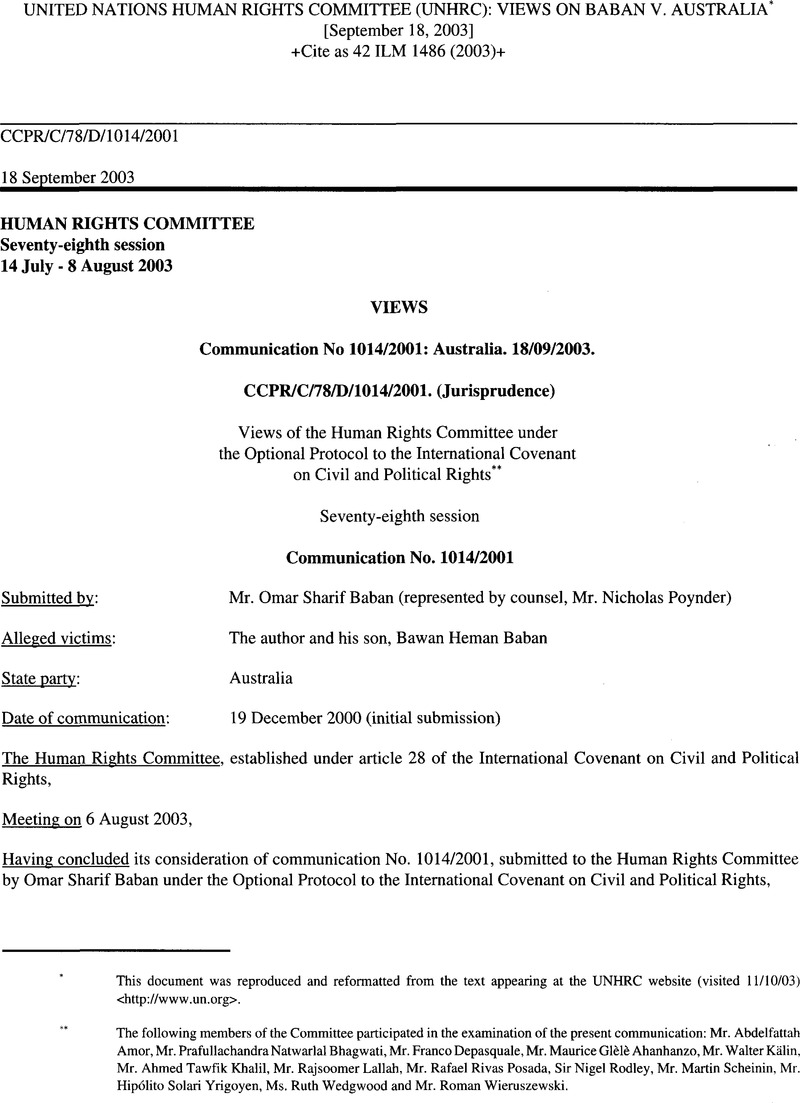Published online by Cambridge University Press: 27 February 2017

This document was reproduced and reformatted from the text appearing at the UNHRC website (visited 11/10/03)<http://www.un.org.>
** The following members of the Committee participated in the examination of the present communication: Mr. Abdelfattah Amor, Mr. Prafullachandra Natwarlal Bhagwati, Mr. Franco Depasquale, Mr. Maurice Glele Ahanhanzo, Mr. Walter Kalin, Mr. Ahmed Tawfik Khalil, Mr. Rajsoomer Lallan, Mr. Rafael Rivas Posada, Sir Nigel Rodley, Mr. Martin Scheinin, Mr. Hipolito Solari Yrigoyen, Ms. Ruth Wedgwood and Mr. Roman Wieruszewski.
1 See, however, paragraph 2.6.
2 The author refers to the Committee's decisions in ARJ v. Australia Case No 692/1996, Views adopted on 11 August 1997, and T v. Australia Case No 706/1996, Views adopted on 4 November 1997.
3 Situation of Human Rights in Iraq, Report submitted by the Special Rapporteur in accordance with Commission on Human Rights resolution 1998/65 (E/CN.4/1999/37, 26 February 1999, at paras 82-83; Human Rights Watch World Report 2000 available at <www.hrw.org/hrw/wr2kl/rnideast/iraq.html#government> and <#kurdistan>.
4 Case No 560/1993, Views adopted on 3 April 1997.
5 The authors refer to Arzuada Gilboa v. Uruguay Case No 147/1983, Views adopted on 2 November 1985, where the Committee found a violation of article 10, paragraph 1, following a fifteen day period of incommunicado detention.
6 The authors point out that the Special Rapporteur on Torture has observed that incommunicado detention “should not exceed seven days” (E/CN.41/1986/15), while the Special Rapporteur on States of Emergency has called for the right of “habeas corpus or other prompt or effective remedy” to be treated as non-suspendible (cited in Marks, S. “Civil Liberties at the Margin: the UK Derogation and the European Court of Human Rights”, (1995) 15 Oxford Journal of Legal Studies 69, at 82-83.
7 The authors observe Third Committee of the General Assembly made express reference to the Standard Minimum Rules for the Treatment of Prisoners (1957) when dealing in 1958 with article 10 in draft. The Committee has considered these Rules relevant to article 10 in both its General Comment 21 and in its consideration of States parties’ periodic reports under the Covenant.
8 Chu Kheng him v. Minister for Immigration and Ethnic Affairs (1992) 176 CLR 1.
9 Op.cit.
10 C v. Australia Case No 900/1999, Views adopted on 28 October 2002.
11 Human Rights and Equal Opportunity Commissions “Those who've come across the seas: Detention of unauthorized arrivals“ available at <www.hreoc.gov.au/pdf/human_rights/asylum_seekers/h5_2_2.pdf>; United States State Department Country Reports on Human Rights Practices for 2000 (February 2001) available at <www.state.gov/g/drl/rls/hrrpt/2000/eap/index.cfm?docid=673> Human Rights Watch Special Report Refugees, Asylum Seekers and Internally Displaced Persons available at <www.hrw.org/wr2kl/special/refugees.2html> Amnesty International AnnualReport 2000; and Steel, Z., Moilica.R. “Detention of asylum seekers: assault on health, human rights and social development” The Lancet Vol 357, 5 May 2001, at 1436.
12 Op.cit.
13 Op.cit.
14 A v. Australia and C v. Australia, op. cit.
15 Ibid.
1 We should not presume what the courts of the State party might decide in a particular case. A court's interpretation of parliamentary intent may be informed by Covenant norms, and the permissible inference that parliament would have wished to comply with the State party's treaty obligations. Accord Young v. Australia, Case No. 941/2000, Views adopted on 6 August 2003 (concurring opinion of R. Wedgwood).
2 The author's claim seeking discretionary release might be deemed moot as well, due to his escape from custody.